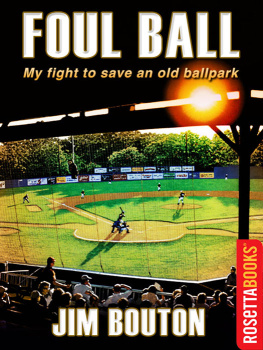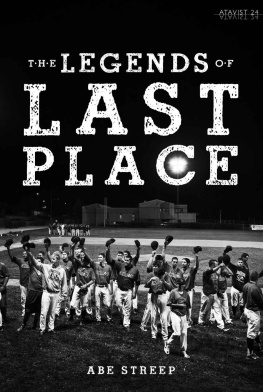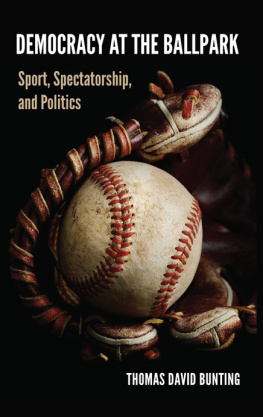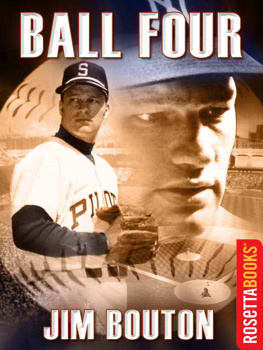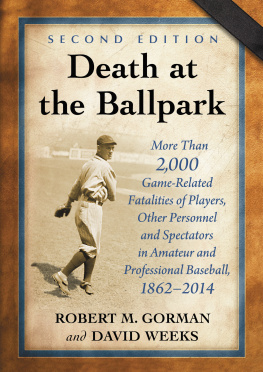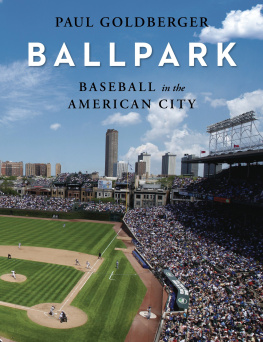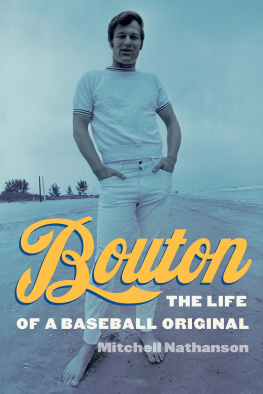All rights reserved. No part of this book may be used or reproduced in any form or by any electronic or mechanical means, including information storage and retrieval systems, without permission in writing from the publisher, except by a reviewer who may quote brief passages in a review.
Electronic edition published 2012 by RosettaBooks LLC, New York.
ISBN e-Pub edition: 9780795323218
DEDICATION
For the determined citizens of Pittsfield, Massachusettsthose Marching Veto Warriors who pounded the pavements, stood in the rain, trudged through the snow, rang the doorbells, passed out the flyers, haunted the supermarkets, and braved the cold at the all-night vigils to gather the signatures that forced the government to cancel its plan to build a new stadium that would have doomed their beloved old ballpark.
You will be the first pitch throwers on Opening Daywhole long lines of you spread across the infieldat a restored Wahconah Park. If there ever is such a day.
Keep your arms loose.
Contents
Like me, you could be unfortunate enough to stumble upon a silent war. The trouble is that once you see it, you cant unsee it. And once youve seen it, keeping quiet, saying nothing, becomes as political an act as speaking out. Either way, youre accountable.
Arundhati Roy
INTRODUCTION
I never intended to write this book. For months I had been throwing notes in a file to write a different book. It was going to be about my 1940s childhood, a Huckleberry Finn-type adventure tale of underground forts and tree huts, inventing games and choosing up sides, and being the only ten-year-old in Rochelle Park, New Jersey, with a paper route and an overhand curve that dropped off a table.
Then I got caught up in a more exciting adventure.
You are no doubt familiar with Americas most costly hostage crisis, perpetrated by the owners of professional sports teams: Build us a new stadium, they warn, or youll never see your team again. This is intended to spread panic in the streets, or at least in the mayors office and in the newspapers.
The only people, besides team owners, who want new stadiums are politicians, lawyers, and the media. Politicos like to swagger around a palaceand stadiums are the modern palacesthe bigger the better, especially for mayors suffering from stadium envy. They like to watch games from the owners box in full view of the TV cameras and hang out in the clubhouse with the players. This is in addition to the usual perks, graft, kickbacks, and patronage that accrue to politicians on big construction projects.
For lawyers, a new stadium offers a virtual buffet. First they get to represent the team against the city, then the city against the people. Then they draft the arguments against a ballot question, and if that doesnt work, they draft the language of the ballot question. Then the bond guys come in and collect astronomical fees for underwriting the municipal debt that will pay for the new stadium. Why do they get so much money for doing that? It would take a lawyer to explain it.
The most insidious of the new-stadium supporters are the media, the so-called free press that Thomas Jefferson once said was more important to a democracy than a legislature. Sportswriters, disguised as journalists, pour out the pro-stadium ink, not just because the swankier press boxes make them feel Big League, but because their bosses frequently own part or all of the team. Even hard news reporters and independent columnists know which side their laptops are buttered on.
Those who dont want new stadiums includes just about everyone elsepeople who: (1) prefer spending tax dollars on schools and hospitals, (2) dont own adjacent real estate, (3) know how to add and subtract.
Were not just talking about a few million dollars of corporate welfare. The amount of public money spent on sports stadiums over the past fifteen years is estimated to be in excess of $16 billion. And thats just whats visible.
Why do so many new stadiums get built if most people dont want them? Because most people dont get to vote on the matter. New-stadium proponentswho also know how to add and subtractdo everything in their collective power to keep the question off the ballot. As Rudolph Giuliani so eloquently put it when asked why New Yorkers should not be allowed to vote on a new stadium, Because they would vote against it.
The fiercest competition in sports these days is not between teams or leagues but between governments and their own citizens. New stadiums are often guided past the rocky shoals of referendums by lame-duck mayors, friendly courts, and compromised county executivesall supported by dire warnings from the local media that the loss of baseball, or the end of the world as they know it, is at hand.
If we build it, they will come has evolved into, If we dont build it, they will go.
No community, no matter how loyal to its team or financially strapped, is exempt from this shameful tactic. A perennial target is New York City, which faces the theoretical loss of the Yankees to New Jerseywhere owner George Steinbrenner has been threatening to move for the past dozen years. Its a bluff, of courseas if Steinbrenner really wants to be a big shot in East Rutherfordbut its a useful excuse for mayors needing a rationale to do something that makes no economic sense whatsoever, at least according to studies done by consultants not on the city payroll.
In spite of the evidence and his understanding of the peoples wishes, Yankee fan Rudolph Giuliani, in his last act as mayor, pushed forward plans for two new stadiumsone each for the Yankees and Mets, to show what a nonpartisan guy he istotaling $1.6 billion! The teams themselves would pay a small portion of that sum for cosmetic reasons, but the bulk of the $1.6 billion, plus cost overruns and a minimum of $300 million in transportation upgrades, would fall to the city, landing on its taxpayers.
And this was after the terrorist attacks of September 11, 2001, with the city facing a budget gap of $4 billion and a projected debt of $40 billion!
By the way, for you landmark preservationists, one of the proposed sites for a new Yankee Stadium, other than the rail yards on the west side of Manhattan, is McCombs Dam Park across from the old Yankee Stadium, which would then be demolished to make room for a parking garage. Theres no word yet on whether this will be called The Garage That Ruth Built.
Did anyone from the Yankees or Mets express appreciation to the city for this proposed bonanza? Not exactly. Steinbrenner indicated that he was actually more thrilled for his fellow New Yorkers. Our fans shouldnt have to wait on line for restrooms and concessions, he said unselfishly on their behalf.
The latest refinement in the owners-holding-teams-hostage game is the threat of eliminating teams altogether via contractionbaseballs linguistic equivalent of collateral damage. This is what faced the Montreal Expos and Minnesota Twins, whose taxpayers have had the temerity to refuse to build new stadiums. In the Twins case, taxpayers refused to build a second new stadium to replace the Metrodome (which opened in 1984), which itself had replaced Metropolitan Stadium where I once pitched against Harmon Killebrew and Tony Oliva. It was only in the negotiations with the Players Association that averted a strike in 2002 that the contraction threat was lifted. But even that is temporary. Part of the deal is that the owners can contract up to two teams after the 2006 season. I wonder if the decision to wait had anything to do with the fact that the most obvious candidate for a 2003 contraction would have been the last-place Milwaukee Brewersthe commissioners daughters team.

